How to Buy and Sell a House
Learn how to buy a house and how to sell a house with confidence. Our tips will help you sell your home and buy another (or your first) like a pro.
This post is the last in my 3-post series on moving. If you haven’t already, check out our How to Pack for a Move post and our Moving Tips and Tricks post.
Hard-won lessons are always the best lessons, but they can be painful and costly. Why spend years of your life and hundreds of thousands of dollars figuring out the best tips and tricks for buying a house and selling a house when we’ve already spent those years and hundreds of thousands of dollars for you?
We’re here to help, madam. Having bought three houses (and sold two) in modern times in three different geographical markets – one pre-pandemic, one pandemic, and one post-pandemic, we feel pretty well-versed with what it takes to make a quick and successful sale and what to look out for to make a purchase to be proud of.
Let’s start with having a look and the ins and outs of selling your home.
How to Sell a House
The rooms that sell a house
We’ve been told time and again (and we’ve read it online) that the master bath is one of two rooms that sell a house. Well, having sold two houses with master baths that we never got around to remodeling or making over, we’d like to disagree with that sentiment. But the number one room for sure is the-
Kitchen

If you’ve got an old and outdated kitchen, your house will sell for less and it likely won’t sell as fast as one with a modern chef’s kitchen. People love kitchens, and if I’m still allowed to split people into two groups – men and women – women, in particular go gaga for a gorgeous kitchen. And let’s be real here – who wields most of the power in a marriage, especially when it comes to (non-motorized) big-ticket items? It ain’t the men, sister, that’s for damn sure!
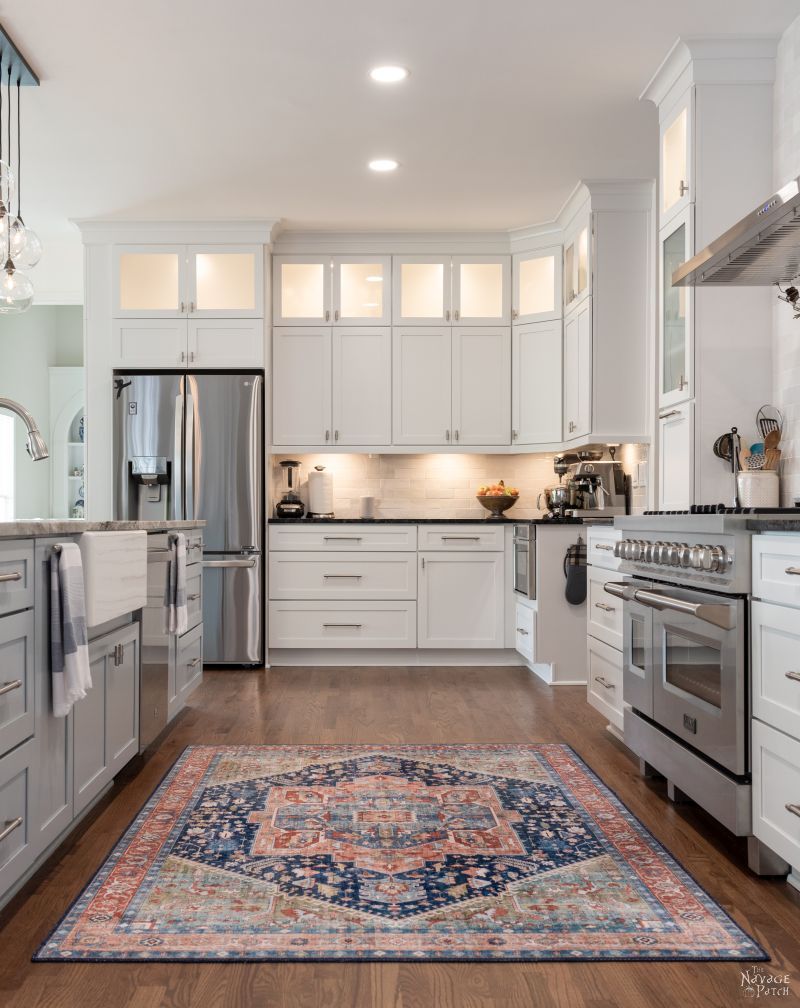
I was lucky enough to have my dream kitchen in Georgia – an absolute stunner that Handan designed. That kitchen sold the house, there’s no doubt about it. We had multiple offers way over asking price, and we went under contract less than 24 hours after the house was listed for sale for a price we never would have dreamed of. The speed with which it sold and the price we got were almost entirely due to our kitchen.
Stone sells
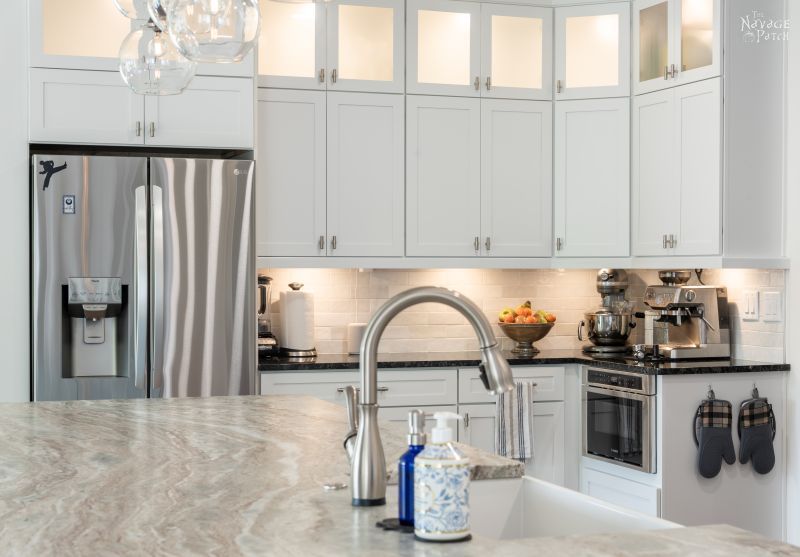
Nothing beats stone countertops. Granite, marble and quartzite are king – they are real, solid stone, hewn from the earth, cut to size, sealed and polished. I suppose you can lump quartz in with the Mighty Three, but quartz is a man-made product of crushed rock and resin fillers. It carries a premium price, and people seem to love it, but if you’re planning to upgrade your countertops, we suggest choosing from granite, marble or quartzite. They look better, cost about the same, and they won’t go out of style as I’m convinced quartz will. [I also think they’ll go out of style soon enough- Handan]
Anyway, if you’ve got rock, you’re a step ahead of those with Corian, laminate, tile, wood, stainless steel, soapstone or concrete countertops.
Updated Cabinetry
The ubiquitous blond oak of the 90s and 00s has fallen out of favor, as has the dark-stained look that followed. We’ve found that painted cabinets in white or light-colored neutrals are the most pleasing to the eye. If new rock countertops are not in your budget before selling, you may consider painting your cabinets. You want your kitchen to grab the attention of that prospective buyer and make them forget about any other flaw they may see elsewhere in your home. To that end, it’s also important to have-
Updated and tasteful fixtures
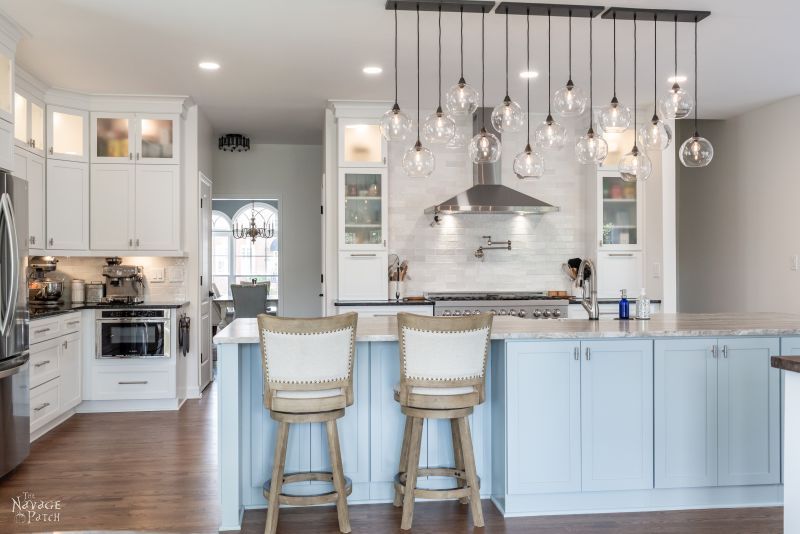
Lighting can make or break a room. It’s worth replacing old lights with new (and maybe go for some daylight bulbs?). If you have an industrial-looking fluorescent on the ceiling (like our Georgia home did when we moved in), you may want to consider swapping it out for recessed can lighting.
Take a look at your knobs, pulls and faucet. Were they purchased when a Bush or Clinton was in office? If so, it’s probably time to change them. If you bought them when Reagan or Carter ran the country, you need to jump in your car this very second and drive as fast as you can the speed limit to Home Depot or Lowe’s to look for suitable replacements.
Bathrooms

Yes, the master bathroom has an effect on buyers, but we don’t count it anywhere near the effect the kitchen has. And we think the guest bathroom and other bathrooms are almost as important as the master. Most prospective buyers are looking for a tub and a decent shower enclosure. It certainly can’t hurt to have a remodeled master bath, but both our previous homes had the original brass-n-glass master baths, and they sold easily.
Laundry
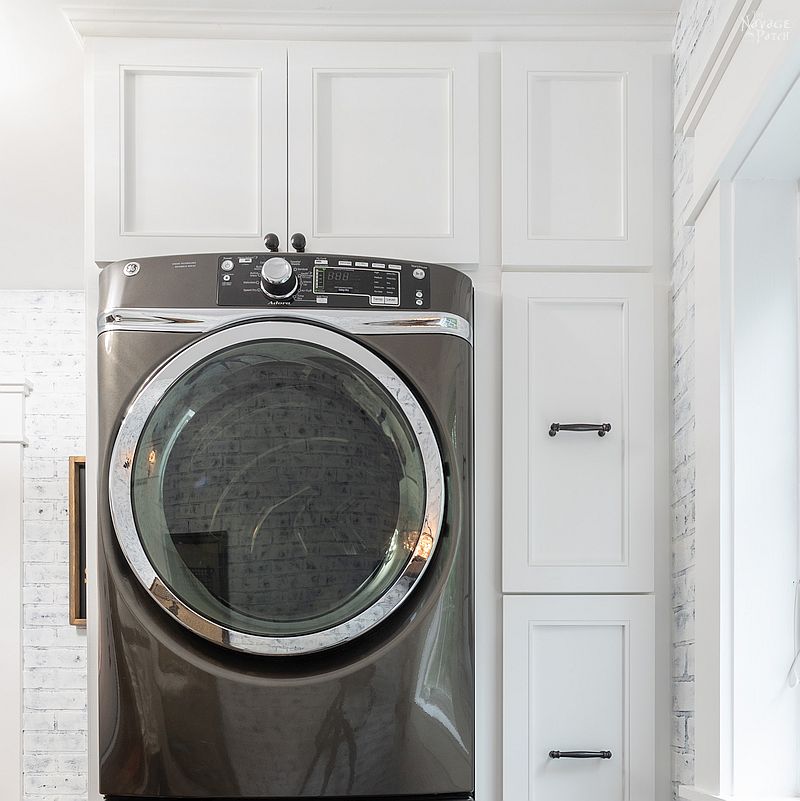
Again, I think some people place too much importance on the laundry room when selling, but it certainly helps sell a house if it’s been remodeled into a “destination” room like the kitchen. If yours is basic, it’s probably not worth remodeling just to sell the house. but if you’re thinking of selling down the road, and you’re thinking of remodeling the laundry, then yes, carry though with those plans.
Other rooms

Bedrooms are usually just four walls, so there’s not much to worry about. The same applies to living and family rooms. Buyers will be filling them with their own furniture, unlike kitchens, bathrooms and remodeled laundry rooms that will have their own cabinetry and fixtures.
How rooms are used
If you’re a fitness nut, and you’ve transformed your living room into a home gym, it may be off-putting to prospective buyers. When people look at houses, they generally want to see rooms used for their intended purposes. Even a home office in a bedroom can make a buyer feel like the house doesn’t have enough bedrooms. Keep room usage traditional during the selling process. This leads us to-
Staging

You don’t need to hire a professional staging company to sell your house. Just use a little restraint. We’ve found the less-is-more approach to work for staging. Keep only the bare minimum amount of furniture. Too many pieces make a room feel small.
I like to remove most decor items as well, leaving only a few tasteful accent pieces. Not everyone may share your taste in decorating, so best not to clobber them over the head with it.
Those pics of your family staring and smiling from every wall, counter, nook and cranny? Take ’em down!
A buyer wants to visualize your home as their home, and it’s kinda tough for them to do that with you and your extended family judging them from the mantel.
I’ve heard many realtors say to avoid green when staging, meaning stay away from too many plants. We don’t necessarily agree with this advice. Obviously there’s a point for anything where enough is enough, but if your walls are white or light neutral, green plants bring a refreshing pop of color.
Other tricks we’ve read about and experienced many times are the assaults on nose and ear to subconsciously sway the buyer: having cookies in the oven to suffuse the house with their smell, lighting scented candles, playing soft jazz or classical music in the background. These are all cheap parlor tricks in our opinion and should be avoided. Every single house we’ve seen that has resorted to these tricks is trying to hide something, and that includes our Connecticut house (baking smells and classical music) and our Florida house (scented candles).
Besides the fact that foreign smells and sounds make us suspicious, you’re taking the risk that your true buyer may actually hate whatever smell you’re pumping through the house and may get turned off of your property because of it.
The previous owner of this house burned (to me) horrible-smelling scented candles when we had our showing. I’m not one to be so easily swayed, but it did make us suspicious.
Just keep the air fresh and clean. If you have pets, and there’s a lingering pet smell, by all means, get your carpets professionally cleaned (which you should do anyway if you’re planning to sell your house), and if the smell still lingers, hire someone to deep clean the house (including the walls). We looked at houses that had a damp and moldy smell – it’s an instant turn-off that ruined the rest of the showing.
Curb appeal

How your house looks when someone pulls up is just as important as what’s inside. First impressions and all that…
If you haven’t already, do some basic landscaping. Refresh the mulch, if there is any. Get rid of weeds. If the foundation is stained with mud, hose it off. If your driveway is concrete – power wash it. If you have a concrete, brick or stone walkway – power wash them, too. Power wash your stoop. If there’s moss growing anywhere, get rid of it. You want the front of your house to look better than the houses on either side.
You only get one shot at curb appeal. Make it count!
Photos
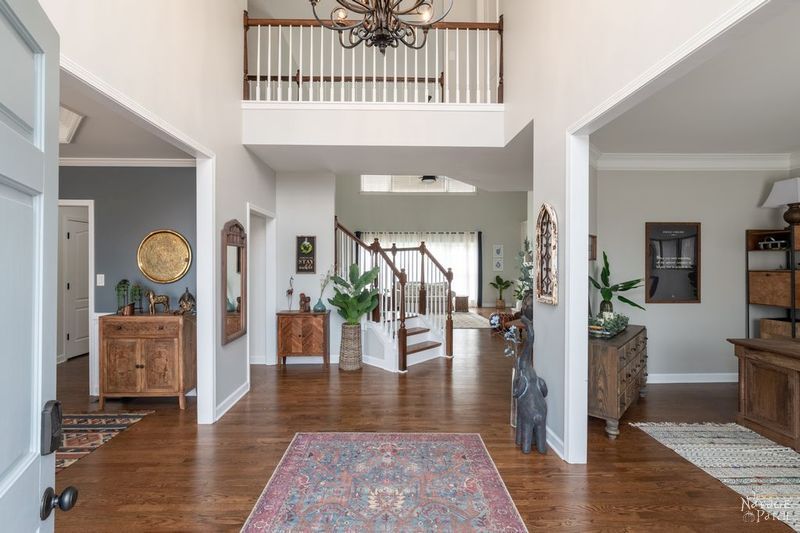
I take my own real estate photos, because I have the gear, the technical skills and the vision to show the house as it should be shown. That said, most people do not have the gear nor the technical skills (this includes post-production using programs like Adobe Lightroom and Photoshop). But if you have a vision about how to best show your home, you can direct the photographer the realtor will hire. If your realtor asks you for some iPhone snaps or wants to take them him- or herself, you may want to think about getting a new realtor.
Before anyone sets foot in your home, photos are your best tool to drum up interest and get people off of their sofas and over to your house.
You absolutely, positively, no-exceptions must have professional real estate photos. If your agent is bringing a photographer in, ask to see their previous work. If you don’t like it, go hire your own photographer. Real estate sessions should only cost a couple hundred bucks, but you get what you pay for. Any less, and the photographer may not be skilled in post-production. Good post-production is vital in real estate photography and is just as important as getting the right angles and the right compositions.
What you’ll need to fix or service and what can slide
Oooh, this is a tough topic and one that shocks and offends many first-time sellers. The house you love so dearly with faults you’ve adapted to over the years will be scrutinized by uncaring eyes, poked, prodded and likely found wanting.
Expect to spend money to bring your house to a salable condition or suffer the consequences down the line when a sale falls through after inspection and the buyer walks.
Three of the biggest and costliest concerns – and the first three things we ask about when viewing a home – are the age of the roof, the age of the HVAC system, and the age of the hot water heater. If any of these systems are over ten years old, you’re getting onto shaky ground. If they are 15 years or older, you may have to replace them before selling. HVAC and water heaters generally have 15-year lifespans, and if yours are north of that number, the buyer’s inspector will note it and will recommend they be replaced. This then becomes a bargaining chip for the buyer.
And even though roofs are touted as being 30 year or 50 year, after about 15 years, they are getting old and may have problems an inspector might find. I don’t suggest running out and buying a new roof and replacing your HVAC system and hot water heater. They may be in good repair, and the inspector may not find any fault other than their age. Just be prepared for the possibility of repair or replacement of those items.

Our first attempt at selling our Connecticut home was scuttled when the inspector noted how old our roof was and falsely claimed it was actively leaking. We were able to prove him wrong, but the damage was done. That buyer walked, even after I agreed to a full roof replacement. I also had to replace the hot water heater in the house, as it was over 20 years old at the time of sale. I got away with not changing the oil furnace (which was a beast), after I got it thoroughly inspected and given a clean bill of health.
Besides the roof, HVAC and hot water heater, you should make sure any electrical issues are fixed before selling.
If you don’t have to replace your HVAC system, potential buyers will almost certainly require proof that it was serviced within the last year.
Don’t worry about a driveway in poor repair. Inspectors are only looking for faults inside the house or on the house (like the roof). Don’t worry about minor cosmetic flaws. Buyers expect to do some work when moving into a new house. That said, if you’ve got holes in the drywall or other glaring non-structural damage, you’ll want to get them repaired.
Get a good agent
A good agent is worth his or her 6% commission. We had an incredible agent to sell our Georgia home – Susan Craig. She specializes in Suwanee and knows the market there and the other agents in the area. When it came time to list, we laid out a strategy of listing price, expected price over listing and what price we’d shut it all down for. We listed on a Tuesday night and exceeded our shut-it-down price by the next afternoon.
Set the right price
In Connecticut, we priced too high on the advice of our realtors, and it backfired (more on that in the next section). In Georgia, we priced reasonably – perhaps even low, given how hot the market was. The thinking and plan was to start a bidding war, and boy, did the plan work! A properly-priced house will always sell – sometimes for much more than anticipated. But an overpriced house can only sell in a red-hot market, and markets can cool literally overnight.
The biggest risk for overpricing is that once a house becomes stale, it gets a stigma. People will think there’s something wrong with it. Why else would it be sitting on the market for so long? And once you have to start cutting the price, all that price history is saved on Zillow and all the other real estate sites. When a house starts showing price weakness, who on earth is going to pay up for it? The only offers that will come in for that house will be discount offers.
Don’t get hung up on open houses
In Connecticut, we listed midweek so we had a couple of days to build up interest for a Saturday open house. This is a common tactic, and it works well. The day after we listed that house, a prospective buyer offered a decent amount (but less than we had listed for) with the stipulation that we cancel the open house and take it off the market. Since our realtors had led me to believe our house would definitely sell for the inflated price we listed at, I (at the advice of our realtors and against Handan’s advice) refused his offer. The open house came and went, and it was very well-attended, but we never got another offer as good as that first one. And when we went back to him, hat in hand, he wisely lowered his offer – one that we ultimately had to take. It was a bitter pill for me to swallow, and it taught me a very good lesson about selling a house (and listening to my babes) – a lesson that was later echoed by Susan Craig in Suwanee: your first offer is usually your best offer, as it is generally from the most motivated and interested buyer.
When we listed our Georgia house, we had the same plan – list midweek, build excitement through the week and then host an open house over the weekend. Well, that didn’t go exactly as planned. We went live on a Tuesday night at 6pm. By 9pm, Susan had the next day entirely booked, and she had to bring her son along so multiple groups could view at once. Cars lined the street as far as the eye could see. Offers started pouring in around lunch time on Wednesday. The first was from the couple that ultimately bought it, but they didn’t have the best price. It was good, and it was over asking, but there were much stronger offers after it. But since they were the first, Susan thought they were probably the most motivated. She called them back and told them there were higher offers (she didn’t say by how much), and if they wanted to have the house, they’d need to come back with a better offer. They said a price and asked that we shut it down and cancel the open house.
I may be dumb, but I’m not stupid. It was a good offer, and it was more than we had hoped, so we accepted their offer and shut it down.
As a side note, we did receive an even higher offer later that night. But a deal is a deal, even if it’s still just a verbal one. We kept our word and stuck with the lower price, as it was the right thing to do.
How to Buy a House
So you’re under contract (congratulations!), or maybe you’re a first-time buyer (congratulations!) – either way, let’s look at the tips and tricks we’ve learned after buying three houses in the past 9 years.
Get pre-approved for a mortgage
A mortgage pre-approval is not required to put an offer on a house, but it will make your offer stronger than one without a pre-approval. It signals to the seller that you’re serious. Your first step is to get pre-approved by the lender of your choice for the absolute maximum you can afford. This is just in case you find that dream house that is just barely within your reach. When you find a house to put an offer on, you would then contact your lender and have them tailor a letter for that amount. If you’re pre-approved for a $500,000 mortgage, and you’re about to put a discounted offer of $380,000 on a $400,000 home, you don’t want that seller to see or know that you’re approved for $500,000, as that would give him little incentive to lower his price. You’re good for the full amount, after all!
Handan and I have used US Mortgage for our Georgia and Florida homes, and we couldn’t be happier with their service. Our mortgage officer is Cassidy Cain, and we’re quite certain there isn’t a better one in all of North America.
Look past cosmetics

Ugly paint outside? Ugly paint inside? Bad wallpaper? It doesn’t really matter, unless you’re the type of buyer who wants to move in and do nothing to the house. Cosmetics turn way too many people off, but they really shouldn’t, as they are so easy to change!
Look out for major pitfalls
Keep an eye out for the telltale signs that something was wrong in the past and covered up. Inspect the ceilings for stains or areas of slightly different color paint. These are the signs of past water damage. And while they cause of the damage may have been fixed, it’s possible the owners just put a little lipstick on the pig. That will be an important area for the house inspector. If they have area rugs on wood floors, take a peek underneath. Not only do carpets protect the wood underneath so it stays dark while that exposed to the sun lightens, but they can also be used to cover up damage. Both of these scenarios will cost money to fix, and you may not otherwise get to see the damage until your final walkthrough, at which time you’ll probably just accept the fact that you were had.
If the house has an unfinished basement, look for cracks in the foundation floors and walls. Bigger cracks can have serious consequences, as they may mean the house is still shifting and settling. Also look for signs of seepage from the cracks. When water intrudes, it tends to leave a white ring after it evaporates. If you you see the signs of water intrusion in he basement, tread very carefully with that house. Basement issues cost a fortune to fix.
Cracks are also pathways for radon gas to enter the house. More on radon in a bit.
Roof, HVAC & water heater – the holy trinity of trouble
The first questions out of our mouth when looking at a home to buy are how old is the roof, how old is the HVAC system and how old is the water heater. If they are 15 years or older, you have every right to ask for them to be replaced or at least for the seller to shoulder some of the replacement costs. The seller may or may not agree, but you should always try to use the holy trinity in your bargaining if at all possible.
You want to know all of this information up front, so you don’t get any nasty surprises if you go under contract and get the house inspected. Speaking of which…
Give a non-contingent offer, if possible
An offer contingent on the sale of your current home will not be as strong as one without any contingencies (except for the inspection contingency – never give up on that!). Sometimes you have to make a contingent offer, but understand that you’ll be in a weaker position.
When Handan and I went under contract to sell our Georgia home, we put a non-contingent offer on the Florida house, even though the deal wasn’t final and we didn’t have that money in-hand. It was a small risk that we were willing to take to make our offer stronger.
Get the house inspected!
In some hot markets, buyers will waive the inspection to close the deal. For Pete’s sake, don’t do this! You never know what nasty secrets are lurking in the bowels of a house. You may even know a thing of two about roofs and HVAC systems, but you won’t be able to test the electrical system. Always get the house inspected, and furthermore, we suggest finding your own inspector.
For our first home purchase in Connecticut, we went with the inspector recommended by our agent. In later years, we learned that he overlooked a ton of important issues from the roof on down to the basement.
We did our own research and hired our own inspector for this Florida home, and we were very happy with the job he did. And if the house you’re under contract for has a basement-
Test for Radon
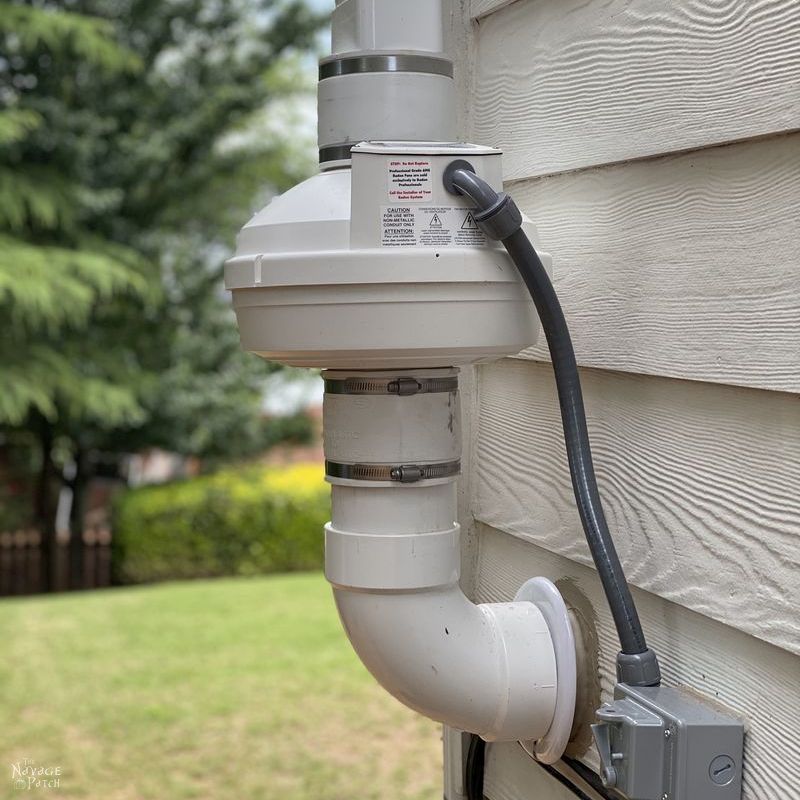
Most people never give it a moment’s thought, but everyone should. It’s real, it’s there, and it’ll kill you. We had radon mitigation systems in Connecticut and Georgia and were happy we did!
Trees

If there are big trees close to the house, the roots can damage the foundation and puncture water and sewage pipes. In a big wind storm, the tree can fall onto the roof and damage the house. This isn’t something you’re likely to get the seller to do anything about, but it’s worth keeping in mind as a future expense.
Septic
If the house has a septic system, you’ll want to get the tank emptied and the system inspected during your inspection period. It’s often overlooked by buyers, but it can lead to a big mess if left unchecked.
I had ours serviced about a week after we moved in. Handan had been complaining that the drains were running slow all over the house. I stood with the septic man as he uncorked the unholy champagne bottle buried in the back yard. To both of our surprise, the tank was full the brim! He said we were a few flushes away from a sewage backup.
I’ve been told that I’m full of shit, but man alive! Even on my most BS-y day, I’ve never been as full of it as that tank! I actually took a ton of pics and video that I will spare you from watching. I found the entire process to be fascinating, and now I know pretty much all there is to know about septic systems.
Oh, for those who are still reading after that last section. My septic guy told me that Rid-X is useless. The only bacteria a septic system needs comes from inside your body, and they are re-introduced into the system every time you flush. Apparently our tank was full of food grease. He showed it to me – clumps of yellow everywhere. He instructed me to pour 5 gallons of degreaser (I used Purple Power) into the system – 1 gallon down the sink and the rest in the toilets. He said it will degrease the tank and the drain field. I love learning new things!
Request a home warranty
A home warranty will cost the seller anywhere from a few hundred dollars to over a thousand, and they’re usually issued for one year or two. The home warranty will generally cover the replacement costs of major home systems and appliances, from HVAC to refrigerators. It’s additional peace of mind if you’re uncertain about some of the systems and appliances in the home.
Put 20 down
While you can certainly buy a house with less than a 20% down payment, your interest rate will be higher, and you’ll have to pay PMI (private mortgage insurance), as you’ll be seen as more of a risk to your lender. With rates on the rise, getting the lowest rate possible is paramount, and that leads to the final point…about points.
Are points right for you?
When people talk about “points,” they mean paying money up front for a lower rate. We did this for the first time with this Florida home to get our rate down to 3.99%. Buying points only makes sense if you’re planning on staying in that house long-term, as we are with this one. You’ll have to do the math while on the phone with your lender to find out how long it will take to break even and have that lower rate working in your favor.
After the Sale

There are a few pointers we can give once you’ve closed and moved into your new home. While each of us will have our own to-do list, there are a few things that everyone should do. If you bought a house with a wood-burning fireplace, get your chimney cleaned and inspected. Always assume the last guy who owned your house was a slob who never cleaned anything.
If you didn’t receive written records of the HVAC system getting serviced within the previous year, have it serviced upon moving in, especially if you’re moving in the summer or winter months.
Change all the locks and deadbolts. The prior owners may have given you they keys, but they may still have a few. And who knows who else they gave them to? Family, friends, neighbors? Better safe than sorry!
For those planning a move, Handan and I wish you good luck and smooth sailing!



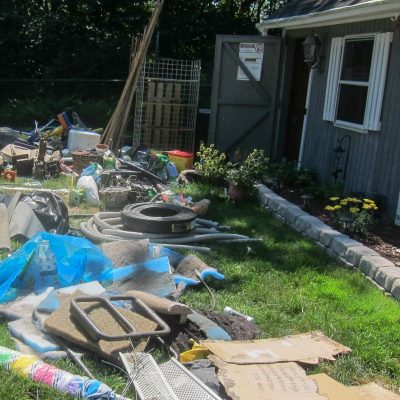

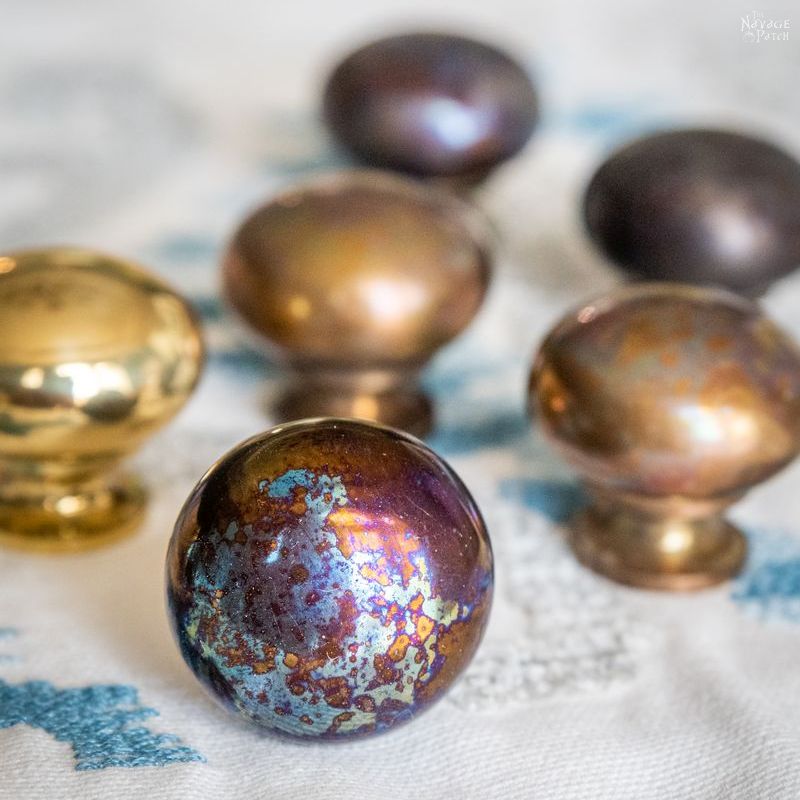


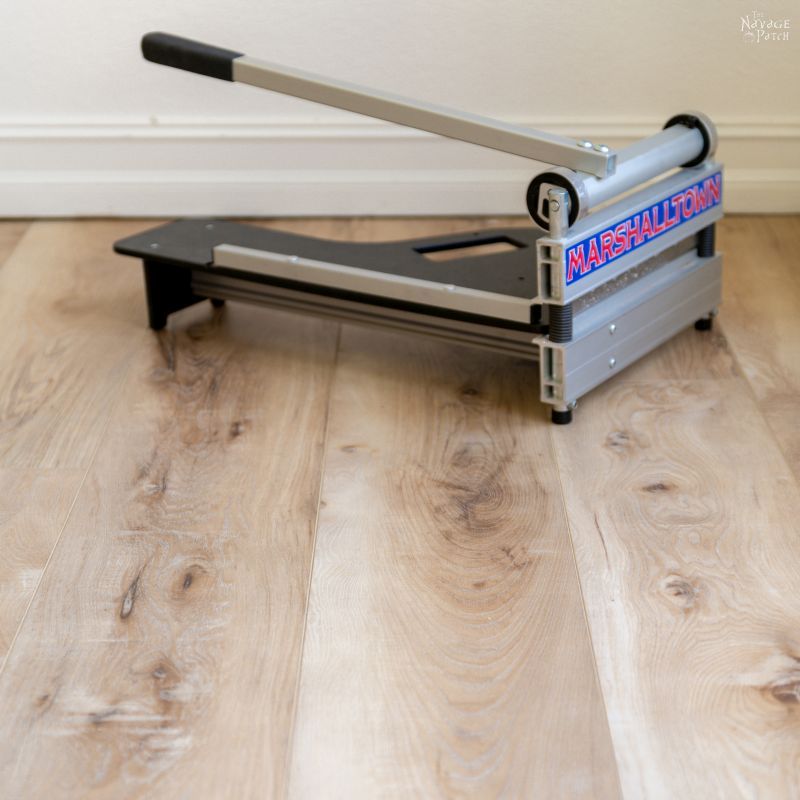
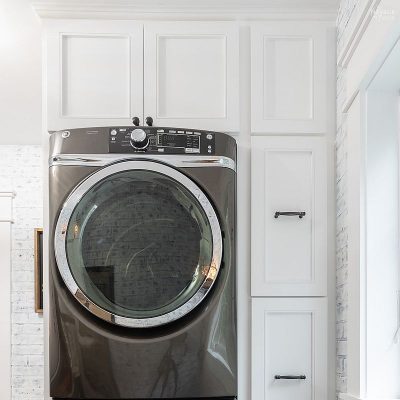

How often do you need to do the Purple Power? I have two houses, both with septic systems, and this is something I didn’t know about!! I’ll stop adding yeast to my tanks as well – thanks!
He didn’t say anything about repeating it, and I think as long as you’re not constantly dumping cooking grease down your drains, you’ll be okay after one treatment. You could see the grease in the tank – it was actually grosser than the “other” stuff!
Holy cow! Those are some concise and cogent buying & selling tips. They’re way better than so many of the different sponsored website ‘tips’.
While I’m not in the market now, these are definitely items of note I will keep for future reference.
I don’t care what anyone else says, you’re pretty … smart. 😉
Why, thank you, Jutta! I will print out a copy of your opinion and read it to myself the next time I feel like a dummy, lol! 😀
Fabulous post! I didn’t know about Purple Power and will be doing this ASAP. Thanks for all your tips. We plan on staying here until we … aren’t, but you never know.
Thank you, Betty! Yep, Purple Power to the rescue!
Terrific advice that can save lots of money and time Thansk for that
Thank you and you’re welcome, Deanna!
Greg this may be the definitive post on buying and selling! Thank you for your hard earned wisdom! I am saving this on Pinterest and will be reading it over and over again! I am done with New York!!
Thank you, Mary! I hear you – we’ve had enough of the cold and crowded Northeast, too!
I was a licenced R/E Broker in 2 states. WOW! Your tips are right on!!! Very impressive!
Best wishes in your new home!
Wow, thank you so much, Christine! That’s high praise coming from a pro! 🙂
This is the best guide to buy and sell a house that I have ever read. It’s really informative, easy to understand and follow, it will help you out in making all the right decisions when buying or selling your home. Thanks Greg for this beautiful blog.
Thank you so much!